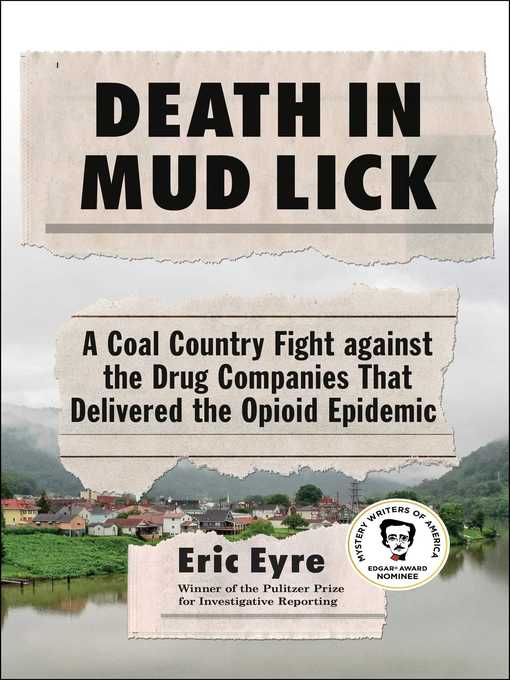
Death in Mud Lick
A Coal Country Fight against the Drug Companies That Delivered the Opioid Epidemic
کتاب های مرتبط
- اطلاعات
- نقد و بررسی
- دیدگاه کاربران
نقد و بررسی

December 15, 2019
A Pulitzer Prize-winning investigative reporter delivers his entry in the (sadly) growing literature about the opioid epidemic ravaging the country. As a reporter at the small-circulation Charleston Gazette-Mail in Charleston, West Virginia, Eyre won the Pulitzer for his writing on the huge shipments of opioids entering his region and how opioid manufacturers, wholesale distributors, and unethical doctors and pharmacists combined to put fatal doses of the dangerous painkillers into the hands of desperate patients. There have been numerous recent books about the opioid crisis--readers can't go wrong with Sam Quinones' Dreamland, Beth Macy's Dopesick, or Chris McGreal's American Overdose--and Eyre covers some of the same ground. However, what distinguishes his book is the author's emphasis on the massive but nearly anonymous wholesale distributors Cardinal Health, AmerisourceBergen, and McKesson, among others. Those companies shipped millions of pills to small-town pharmacies that never could have needed such volumes; for instance Kermit, which has a population of less than 400 and was "drowning in prescription painkillers." Eyre clearly explains how the Drug Enforcement Administration and the West Virginia Board of Pharmacy could have ameliorated the flood of pills but did nothing. Another powerful actor who enabled the epidemic was West Virginia's attorney general, Patrick Morrisey, a Republican politician who lied about his involvement and failed to recuse himself while his wife received payment from Cardinal Health as a lobbyist. While battling for disclosures via freedom of information lawsuits in the courts, Eyre located numerous victims of the indiscriminate pill shipments, including many users who had buried multiple family members and friends after they overdosed. Unsurprisingly, his accounts of his interactions with them are disturbing, moving, and heart-wrenching. Portions of the narrative feature first-person narration, as the author illuminates how time-consuming, budget-busting investigative journalism functions despite circumstances that mitigate against it. The drama ratchets up as Eyre battles early-onset Parkinson's disease. Timely, depressing, engrossing reportage on an issue that can't receive too much attention.
COPYRIGHT(2019) Kirkus Reviews, ALL RIGHTS RESERVED.

Starred review from January 13, 2020
Charleston Gazette-Mail reporter Eyre expands his Pulitzer Prize–winning investigation into the role of pharmaceutical distribution companies in West Virginia’s opioid epidemic in this riveting and essential debut. Eyre begins by relating the 2005 overdose death of former coal miner William “Bull” Preece, who became hooked on Oxycontin and Lortab after suffering a back injury on the job. His sister, Debbie, became an anti-opioid crusader and her lawyers eventually contacted Eyre, who in 2013 was covering West Virginia’s lawsuit against wholesale drug distributors, including Fortune 500 companies Cardinal Health and AmerisourceBergen, for flooding the market with pain pills. Eyre eloquently interweaves the story of Debbie’s pursuit of justice on behalf of her brother with his own battles against West Virginia attorney general Patrick Morrisey, whose ties to the pharmaceutical industry called into question his commitment to pursuing the state’s lawsuit. As Eyre labored—ultimately successfully—to pry information from obfuscating drug firms and government agencies, he was also contending with Parkinson’s disease and his small-town newspaper’s financial woes. Packed with colorful details and startling statistics, this page-turning journalistic thriller shines a brilliant spotlight on a national tragedy. Agent: Frances Coady, Aragi Inc.

Starred review from February 1, 2020
Pulitzer Prize-winning reporter Eyre (Charleston Gazette-Mail) explains how pain management became big business in Kermit, WV, where 300 people were responsible for the distribution of more than 12 million opioid pills in the span of three years. Based on extensive investigative reporting, this work follows the trail of drug companies after one man's death from an overdose of prescription pain pills, leading the man's sister to file a wrongful death suit. After receiving a tip that the suit would face serious challenges from powerful drug company interests in the state, Eyre discovered that staggering quantities of opioids were being shipped into small towns in West Virginia and nearby states, with the drug network being supported by several companies. During his reporting, Eyre stumbles upon pill parties in parking lots and exposes inadequate DEA oversight, blatant conflicts of interest, and testimony from drug company executives expressing some remorse but no admissions of guilt for the actions. The book ends with an unresolved question: Is the multimillion dollar settlement from drug companies enough? VERDICT Timely and well documented, with appeal to a broad range of readers.--Antoinette Brinkman, formerly with Southwest Indiana Mental Health Ctr. Lib., Evansville
Copyright 2020 Library Journal, LLC Used with permission.

Starred review from February 15, 2020
When William "Bull" Preece died of an overdose in 2005, his flinty sister Debbie recruited her friend, lawyer Jim Cagle, to find out why. A tiny mom-and-pop pharmacy in Kermit, West Virginia (population 382) had received shipments of a staggering 9 million opioid pain pills in just two years. How could these clearly illegal sales go unchecked? The West Virginia attorney general taps Cagle to sue several drug distributors?until the election of a new, business-friendly attorney general, Patrick Morrisey, whose wife was?no joke?a lobbyist for one such distributor. Eyre covered the many threads of the story for the Charleston Gazette-Mail, chasing down a Goliath who kept changing: the distributors, who passed the blame to crooked doctors and pharmacists and, eventually, the addicts themselves; Morrisey, denying blatant conflicts of interest in late-night Twitter rants; and the DEA, a boar's nest of either incompetence or corruption. Meanwhile, the Gazette-Mail faces bankruptcy and layoffs, and Eyre himself faces a personal health crisis. This is an infuriating story, compellingly told, and adds another layer to the reporting of the opioid crisis laid out in Beth Macy's Dopesick (2018). It is also a tale of compassionate people deeply wronged and a dogged journalist who won't stand for it.(Reprinted with permission of Booklist, copyright 2020, American Library Association.)

























دیدگاه کاربران